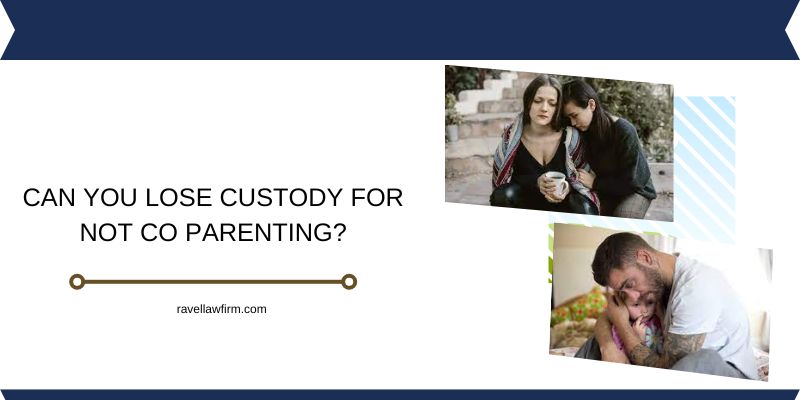Yes, it is possible to lose custody of your child if you are not a good co-parent. The ability of each parent to collaborate and raise their child cooperatively is a criterion that courts prioritize when determining custody rights. This is often also regarded as bad coparenting.
The child’s wellbeing and capacity to make choices that are in their best interests may suffer if one parent is unwilling to co-parent or interact with the other parent. A parent may also have their visiting rights restricted or their custody removed by the court if they are actively harming the other parent’s connection with the kid or engaged in risky or destructive behavior.

The child’s bond with each parent, either parent’s capacity to meet the child’s emotional and physiological requirements, and their willingness to collaborate to make choices that are in the child’s best interests are all things that courts will consider while deciding custody.
The court may grant full custody to the other parent or restrict the uncooperative parent’s visitation privileges if one parent is persistently uncooperative or reluctant to co-parent. To assist the parents in enhancing their ability to communicate and co-parent, the court may in some circumstances additionally mandate counseling or mediation.
Nonetheless, judgments about child custody are made based on what is best for the kid, and the court will take all relevant circumstances into account, including each parent’s capacity to effectively co-parent the child.
Can a Parent Lose Custody for Parental Alienation?
Absolutely, parental alienation can result in a parent’s loss of custody. When one parent seeks to control a child’s thoughts and feelings to turn them against the other parent, it is referred to as parental alienation. This situation frequently results in the youngster rejecting to see or interact with the detached parent.
Although parental alienation isn’t expressly forbidden by law, courts have acknowledged the impact it can do to kids and have the authority to change custody agreements or even remove parents from their children’s lives if it’s required to uphold the child’s best interests.

Courts often perceive parental alienation as a kind of psychological abuse and may consider it a concern in custody decisions. A judge may mandate family counseling or treatment, change the custody arrangement to reduce or prohibit the alienating parent’s contact with the kid, or even grant custody to the other parents or a third party if they find that one parent is involved in parental alienation.
Not all instances of a kid refusing to see a parent are the result of parental alienation, and the court must decide if parental alienation is taking place based on the particular facts of the case. A parent would need to partake in extensive and deliberate alienating behavior to run the risk of losing custody, as courts often prefer to keep both parents involved in a child’s life if possible.
Can a Mother Lose Custody for Alienating Father?
A mother may lose custody of the child if she is convicted of alienating the child’s father. The mother’s behavior might not be in the best interests of the child, and the court can decide that it’s necessary to take the child away from her. After carefully weighing all the information, including the child’s mental and psychological condition, the mother’s actions, and the father’s capacity to give the child a stable and safe environment, this judgment may be made.
In some circumstances, the court may mandate family counseling or treatment in an effort to mend the child’s relationship with the father. But the court may choose to completely revoke the mother’s parental rights if she keeps acting in an alienating manner or defies its directives.
It is crucial to understand that taking custody away from a mother is a serious decision that is made only after carefully considering all the available options. The welfare of the kid and ensuring that they have a secure and caring environment to grow up in are always the court’s top priorities.
See Also: How a Mother Can Lose a Custody Battle?
FAQ’s
What happens when a parent refuses to co parent?
When a parent refuses to co-parent, it may result in legal repercussions including fines, loss of custody, or in severe situations, even imprisonment.
Can a parent lose custody for being a narcissist?
A parent may lose custody if it is determined that their narcissism is endangering the child’s wellbeing, however being a narcissist alone does not automatically result in custody being lost.
Is co-parenting the same as joint custody?
Co-parenting is a parenting method in which both parents contribute to the child’s upbringing, but joint custody is a legal custody arrangement in which both parents share equal choice authority, they are not the same thing.

Hi, I’m Brian Gary; I have my Doctor of Juridical Science (SJD) degree from SMU Dedman School of Law in Dallas. Over the years, I have dealt with many families and successful corporate Legal cases. I have counseled many people on legal matters, and along with my profession, I write about Law on my blog. Please feel free to contact me for counseling/case discussion; I’ll be happy to help you.